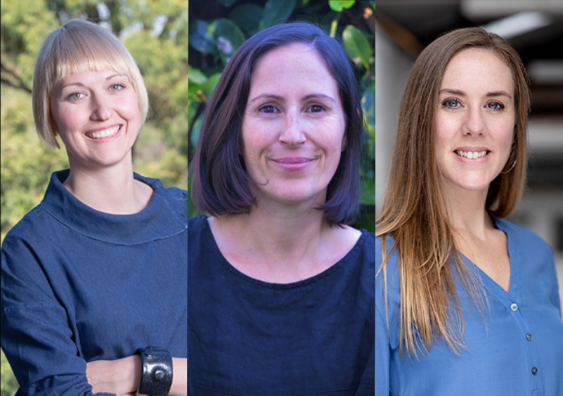UNSW researchers receive prestigious Paul Bourke Award
Dr Kari Lancaster at the Centre for Social Research in Health (CSRH) at UNSW Arts & Social Sciences, Dr Sarah Walker at UNSW Business School and Dr Michelle Tye at UNSW Medicine and Black Dog Institute have been honoured with a 2020 Paul Bourke Award. The Academy of the Social Sciences in Australia early career research award recognises some of Australia’s best young social science researchers.
Dr Lancaster has been recognised for her significant contributions to the critical social study of evidence-based policy and practice in relation to drugs and infectious disease. Dr Walker is a development economist working on a wide range of topics including labour-force participation, the effects of refugee camps and the relationship between conflict, development and the natural environment. Dr Tye’s work has substantially advanced national suicide prevention efforts.
Academy President Professor Jane Hall said the recipients had been selected from an extremely talented field of applicants.
“These young researchers are producing high-quality research which addresses some of the critical challenges facing our society today,” she said. “They are deserving winners of this award and join a very select list of previous recipients, many of whom have gone on to make substantial contributions to society.”
UNSW Pro Vice-Chancellor, Research, Professor Ana Deletic congratulated the researchers on the award.
“This is certainly a year of achievement, receiving three of the four 2020 Paul Bourke Awards. We are extremely proud of our recipients and this recognition of our early career humanities and social sciences researchers,” she said.
Dr Kari Lancaster at UNSW Centre for Social Research in Health
Dr Lancaster works at the intersection of public health sociology, science and technology studies, and policy studies. She has published over 65 articles in leading international journals and received more than $4 million in funding. The quality and impact of Dr Lancaster’s research has been recognised internationally, including as a recipient of the International Society for the Study of Drug Policy’s (ISSDP) Early Career Researcher Award.
Her innovative program of work is developing critical approaches to the social study of ‘evidence-making’ and intervention translations in health. It has gained international recognition with invited presentations at Oxford University, Munich Public Health Forum, Australasian Association for the History, Philosophy, and Social Studies of Science Conference and ISSDP Conference. Dr Lancaster has an outstanding capacity to combine high-quality research with direct translational activities that result in policy change.
Watch this video interview with Dr Lancaster.
Dr Sarah Walker at UNSW Business School
Dr Walker’s work has been published in leading journals in the field, such as Journal of Development Economics and Journal of Economic History. Her research is typical of the best work in this field: using a range of empirical methods including randomised controlled trials, regression discontinuity analysis and other techniques to identify the causal effects of policy interventions. Her creativity and breadth have established her as an internationally recognised scholar in development economics and applied microeconomics more generally.
Watch this video interview with Dr Walker.
Dr Michelle Tye at UNSW Medicine and Black Dog Institute
Dr Tye has published more than 60 papers in leading international journals as well as a book chapter. She has led and contributed to research that has attracted more than $20 million in funding in the past four years, including a National Health and Medical Research Council (NHMRC) Early Career Fellowship (2018). Her growing international profile is reflected in membership of special interest groups, invited editorial positions, invited speaking invitations and international collaborations. Dr Tye’s scientific excellence has been recognised in several prestigious awards, including a NSW Tall Poppy (2018) and an Early Career Excellence Award from the Mental Health Society (2019). Her exemplary track record is combined with strong translational impact that is rare at her career stage, strongly positioning her as an emerging research leader.
Watch this video interview with Dr Tye.
The Paul Bourke Award is named in honour of the late Professor Paul Bourke, a political historian who was president of the Academy of the Social Sciences in Australia from 1993 to 1997.
The fourth 2020 Paul Bourke Award recipient is Dr Dylan Lino from the University of Queensland, whose work has been influential in informing debate on Indigenous constitutional recognition in Australia.

